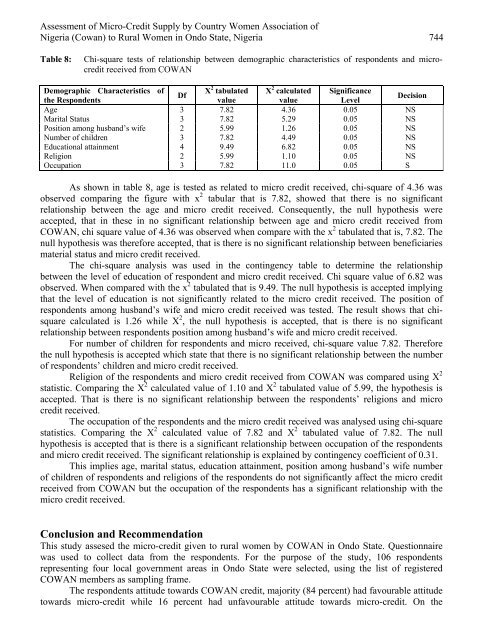European Journal of Scientific Research - EuroJournals
European Journal of Scientific Research - EuroJournals
European Journal of Scientific Research - EuroJournals
You also want an ePaper? Increase the reach of your titles
YUMPU automatically turns print PDFs into web optimized ePapers that Google loves.
Assessment <strong>of</strong> Micro-Credit Supply by Country Women Association <strong>of</strong><br />
Nigeria (Cowan) to Rural Women in Ondo State, Nigeria 744<br />
Table 8: Chi-square tests <strong>of</strong> relationship between demographic characteristics <strong>of</strong> respondents and microcredit<br />
received from COWAN<br />
Demographic Characteristics <strong>of</strong><br />
the Respondents<br />
Df<br />
X 2 tabulated<br />
value<br />
X 2 calculated<br />
value<br />
Significance<br />
Level<br />
Decision<br />
Age 3 7.82 4.36 0.05 NS<br />
Marital Status 3 7.82 5.29 0.05 NS<br />
Position among husband’s wife 2 5.99 1.26 0.05 NS<br />
Number <strong>of</strong> children 3 7.82 4.49 0.05 NS<br />
Educational attainment 4 9.49 6.82 0.05 NS<br />
Religion 2 5.99 1.10 0.05 NS<br />
Occupation 3 7.82 11.0 0.05 S<br />
As shown in table 8, age is tested as related to micro credit received, chi-square <strong>of</strong> 4.36 was<br />
observed comparing the figure with x 2 tabular that is 7.82, showed that there is no significant<br />
relationship between the age and micro credit received. Consequently, the null hypothesis were<br />
accepted, that in these in no significant relationship between age and micro credit received from<br />
COWAN, chi square value <strong>of</strong> 4.36 was observed when compare with the x 2 tabulated that is, 7.82. The<br />
null hypothesis was therefore accepted, that is there is no significant relationship between beneficiaries<br />
material status and micro credit received.<br />
The chi-square analysis was used in the contingency table to determine the relationship<br />
between the level <strong>of</strong> education <strong>of</strong> respondent and micro credit received. Chi square value <strong>of</strong> 6.82 was<br />
observed. When compared with the x 2 tabulated that is 9.49. The null hypothesis is accepted implying<br />
that the level <strong>of</strong> education is not significantly related to the micro credit received. The position <strong>of</strong><br />
respondents among husband’s wife and micro credit received was tested. The result shows that chisquare<br />
calculated is 1.26 while X 2 , the null hypothesis is accepted, that is there is no significant<br />
relationship between respondents position among husband’s wife and micro credit received.<br />
For number <strong>of</strong> children for respondents and micro received, chi-square value 7.82. Therefore<br />
the null hypothesis is accepted which state that there is no significant relationship between the number<br />
<strong>of</strong> respondents’ children and micro credit received.<br />
Religion <strong>of</strong> the respondents and micro credit received from COWAN was compared using X 2<br />
statistic. Comparing the X 2 calculated value <strong>of</strong> 1.10 and X 2 tabulated value <strong>of</strong> 5.99, the hypothesis is<br />
accepted. That is there is no significant relationship between the respondents’ religions and micro<br />
credit received.<br />
The occupation <strong>of</strong> the respondents and the micro credit received was analysed using chi-square<br />
statistics. Comparing the X 2 calculated value <strong>of</strong> 7.82 and X 2 tabulated value <strong>of</strong> 7.82. The null<br />
hypothesis is accepted that is there is a significant relationship between occupation <strong>of</strong> the respondents<br />
and micro credit received. The significant relationship is explained by contingency coefficient <strong>of</strong> 0.31.<br />
This implies age, marital status, education attainment, position among husband’s wife number<br />
<strong>of</strong> children <strong>of</strong> respondents and religions <strong>of</strong> the respondents do not significantly affect the micro credit<br />
received from COWAN but the occupation <strong>of</strong> the respondents has a significant relationship with the<br />
micro credit received.<br />
Conclusion and Recommendation<br />
This study assesed the micro-credit given to rural women by COWAN in Ondo State. Questionnaire<br />
was used to collect data from the respondents. For the purpose <strong>of</strong> the study, 106 respondents<br />
representing four local government areas in Ondo State were selected, using the list <strong>of</strong> registered<br />
COWAN members as sampling frame.<br />
The respondents attitude towards COWAN credit, majority (84 percent) had favourable attitude<br />
towards micro-credit while 16 percent had unfavourable attitude towards micro-credit. On the

















